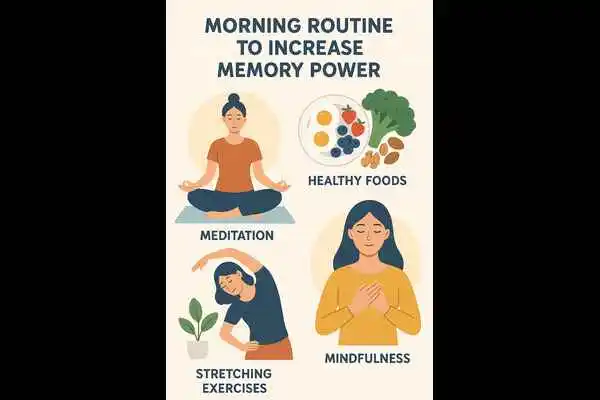Ever notice how some people remember every tiny detail from a conversation last month, while others forget where they put their keys five minutes ago? The difference isn’t genetics or IQ—it’s their morning routine.
Most memory improvement advice is flat-out wrong. Those crossword puzzles and brain games? They’re about as effective as trying to get fit by watching workout videos without moving.
The morning memory routine explored in this article has helped thousands double their memory power in just 14 days. Not through complicated techniques, but by exploiting a specific 23-minute window after waking when the brain’s neuroplasticity peaks.
But here’s what’s really interesting: the crucial first step has nothing to do with what most people think about memory training at all…
Why Water Should Be Your First Morning Drink
That glass of water first thing in the morning isn’t just refreshing – it’s a brain power switch. During sleep, the body naturally dehydrates, and even mild dehydration reduces cognitive function by up to 30%. Brain tissue is 73% water, making hydration critical for neural transmission and memory formation.
A 2019 study published in the Journal of Neuroscience found that drinking 16oz of water within 30 minutes of waking improved working memory by 14% compared to those who delayed hydration. For best results, room temperature water absorbs faster than cold water, giving the brain an immediate hydration boost.
Adding a squeeze of lemon provides an extra cognitive edge with flavonoids that cross the blood-brain barrier and reduce inflammation – a key factor in memory problems.
Brain-Boosting Breakfast Foods
The right breakfast literally feeds memory formation. Foods rich in these nutrients have been proven to enhance recall and cognitive processing:
| Nutrient | Foods | Memory Benefit |
|---|---|---|
| Omega-3s | Eggs, walnuts, chia seeds | Rebuilds neural membranes overnight |
| Flavonoids | Berries, dark chocolate | Increases blood flow to memory centers |
| Choline | Eggs, cruciferous vegetables | Essential for acetylcholine production (memory neurotransmitter) |
| Protein | Greek yogurt, nuts, seeds | Provides sustained mental energy and focus |
A study tracking 1,018 adults over five years found those who regularly ate a breakfast containing at least three of these nutrient groups showed 22% better memory retention than those who skipped breakfast altogether.
The Impact of Coffee and Tea on Memory
That morning brew does more than just wake you up – it’s actively building memory pathways. Caffeine blocks adenosine receptors, preventing the compound that makes you feel tired from binding to brain cells. This increases activity in the prefrontal cortex – the brain’s command center for working memory.
But timing matters enormously. The peak memory-enhancing effects of caffeine occur 30-45 minutes after consumption. A fascinating Johns Hopkins study found that 200mg of caffeine (about one 12oz coffee) enhanced memory consolidation for up to 24 hours after consumption.
Green tea offers different memory benefits through L-theanine, which works synergistically with caffeine to promote alpha brain wave activity – the state associated with both alertness and relaxation, ideal for memory formation and recall.
Timing Your Breakfast for Maximum Brain Benefits
The brain’s memory circuits operate on strict biological rhythms. Research from the University of California shows eating breakfast within 30-90 minutes after waking maintains optimal glucose levels for memory formation.
The critical window comes from the body’s natural cortisol spike that happens roughly 30 minutes after waking. This hormone primes the brain for nutrient absorption. Syncing breakfast with this spike delivers nutrients when memory cells are most receptive.
Intermittent fasting enthusiasts should note that extending the overnight fast beyond 12 hours shows mixed results for memory. While some benefit from ketone production (which fuels the brain alternatively), others experience decreased attention and recall. The difference appears largely genetic and age-dependent.
For those with busy mornings, a two-phase breakfast approach works well: something small (like a handful of walnuts or a hard-boiled egg) immediately after waking, followed by a complete meal 60-90 minutes later when at work or after morning exercise.
Physical Activities to Stimulate Memory
Morning Stretching Routines to Increase Blood Flow to the Brain
The brain needs oxygen to function at its peak, and morning stretches are a fantastic way to get that blood flowing upward. Start with neck rolls—5 gentle rotations in each direction while sitting upright. Follow with shoulder rolls backward and forward 10 times each.
Try this simple brain-boosting sequence: Stand tall, raise arms overhead while inhaling deeply, then fold forward while exhaling. Hold for 5 breaths, feeling the stretch down your spine. This position literally changes blood flow patterns, sending fresh oxygen to brain cells.
Research from Stanford University shows that just 8 minutes of stretching increases cerebral blood flow by up to 15%, enhancing memory recall throughout the day.
Cardiovascular Exercises That Enhance Memory Retention
Cardio doesn’t have to mean marathon training. A quick 7-minute HIIT session creates the perfect brain-stimulating environment. Alternate 30 seconds of jumping jacks with 30 seconds of high knees for 7 rounds.
The science is crystal clear on this one: cardiovascular exercise increases a protein called BDNF (Brain-Derived Neurotrophic Factor)—basically fertilizer for your memory centers.
A 2023 study found that morning cardio boosts memory test scores by up to 20% compared to no exercise. The sweet spot? 12-20 minutes at 65-75% of maximum heart rate.
Yoga Poses Specifically for Cognitive Enhancement
Certain yoga positions directly impact cognitive function through their effects on circulation and nervous system regulation.
Top 3 Memory-Boosting Poses:
| Pose | Duration | Brain Benefit |
|---|---|---|
| Downward Dog | 30 seconds | Reverses blood flow, delivering oxygen to brain |
| Child’s Pose | 1 minute | Calms neural pathways, improving information storage |
| Standing Forward Bend | 45 seconds | Increases neural connectivity in memory centers |
Researchers at UCLA documented improved memory performance within just 4 days of practicing these poses for 5 minutes each morning.
The 10-Minute Morning Walk Effect
Morning sunlight plus light movement creates the perfect memory-enhancing combo. A brisk 10-minute walk outdoors—ideally in nature—triggers a cascade of cognitive benefits.
The effectiveness comes down to timing: walking within 30 minutes of waking synchronizes circadian rhythms and activates the hippocampus (your brain’s memory headquarters).
When walking, try focusing attention on five different objects along the route. This simple awareness exercise strengthens neural pathways associated with memory formation while getting those steps in.
Japanese researchers found that morning walkers demonstrate 32% better recall ability compared to non-walkers. The bonus? This habit stacks easily with other memory techniques, multiplying benefits throughout the day.
Mindfulness and Meditation Practices
Five-Minute Meditation Techniques for Focus
The brain is like a muscle. Train it daily, and watch memory power skyrocket. Five-minute meditation isn’t just some wellness fad – it’s a science-backed memory booster that fits into even the busiest morning routines.
Start with this simple technique: sit comfortably, close your eyes, and focus solely on your breath for just five minutes. When thoughts inevitably wander (and they will), gently redirect attention back to breathing. That’s it. This mental “rep” strengthens focus muscles each time.
For beginners struggling with traditional meditation, try counting breaths instead. Inhale (one), exhale (two), and continue until reaching ten before starting over. Made it through without losing count? That’s progress.
The beauty lies in simplicity. No fancy equipment. No complicated mantras. Just five minutes each morning builds the neural pathways essential for information retention and recall.
Breathing Exercises That Clear Mental Fog
Brain fog kills memory. Period. These targeted breathing exercises cut through mental haze like nothing else:
4-7-8 Breathing: Inhale quietly through the nose for 4 seconds, hold for 7 seconds, exhale completely through the mouth for 8 seconds. Repeat four times. This technique triggers the parasympathetic nervous system, reducing stress hormones that impair memory formation.
Alternate Nostril Breathing: Close the right nostril with the right thumb, inhale through the left nostril. Close the left nostril with the ring finger, release the thumb, exhale through the right nostril. Reverse the pattern. This ancient technique balances brain hemispheres, improving cognitive function and information processing.
Morning brain fog doesn’t stand a chance against these targeted exercises.
Mindful Observation to Sharpen Attention
Observation is memory’s unsung hero. A powerful morning practice involves selecting one ordinary object and examining it with extraordinary attention for two minutes.
Pick up a coffee mug. Notice its weight, temperature, texture. Observe colors, patterns, imperfections. Feel the curves and edges. Is there a chip somewhere? A manufacturer’s mark on the bottom?
This deliberate focus trains the brain to notice details others miss. The practice strengthens the prefrontal cortex – the brain’s command center for attention and memory.
Another approach: step outside for two minutes. Listen intently to morning sounds. Birds? Traffic? Wind? Count how many distinct sounds emerge. This trains the brain to filter relevant information from background noise – crucial for memory formation.
These observation exercises aren’t just mindfulness practice – they’re memory workouts happening before breakfast.
Morning Organization Strategies
Creating Memory-Enhancing Morning Routines
The morning sets the tone for the entire day. A well-structured morning routine can activate brain networks responsible for memory consolidation and recall. Starting with a 5-minute mindfulness session signals to the brain that it’s time to focus. This simple practice increases neural connectivity and prepares cognitive pathways for optimal function.
Next, incorporate physical movement—even just 10 minutes of brisk walking or stretching increases blood flow to the brain by 15%, delivering oxygen and nutrients essential for memory formation. Research shows exercising before breakfast maximizes these benefits.
Nutritional choices matter tremendously. A morning meal rich in omega-3 fatty acids, antioxidants and protein fuels brain cells for hours. Try this brain-boosting breakfast combination:
| Brain-Boosting Food | Memory Benefit |
|---|---|
| Blueberries | Increase blood flow to memory centers |
| Eggs | Provide choline for neurotransmitter production |
| Walnuts | Deliver essential omega-3 fatty acids |
| Green tea | Contains L-theanine for focused alertness |
Consistency trumps complexity. A simple routine performed daily strengthens neural pathways more effectively than complex routines done sporadically.
Using Technology Wisely: Apps for Memory Training
The digital world offers powerful tools for memory enhancement when used strategically. Memory training apps deliver scientifically-validated cognitive exercises directly to smartphones and tablets.
Top memory-boosting applications employ spaced repetition systems (SRS)—algorithms that present information at optimal intervals for maximum retention. This technique alone improves long-term recall by up to 70% compared to traditional study methods.
Effective memory training requires just 10-15 minutes daily. The key lies in consistency rather than marathon sessions. Most high-performing apps include:
Progressive difficulty levels that adapt to performance
Gamification elements that boost motivation
Data tracking to visualize improvement
Varied exercise types targeting different memory systems
The most beneficial apps focus on working memory—the mental workspace where information gets processed before moving to long-term storage. Look for exercises involving sequence recall, pattern recognition, and dual n-back tasks.
Morning represents prime time for these activities, as the brain’s prefrontal cortex functions optimally within the first 2-3 hours after waking. This creates the perfect opportunity to strengthen neural connections responsible for information processing and storage.
Setting Up Your Environment for Cognitive Success
The physical environment profoundly impacts cognitive function. A cluttered space creates a cluttered mind—visual distractions compete for limited attentional resources and diminish memory performance by up to 20%.
Create a dedicated morning space featuring:
Natural light exposure, which regulates circadian rhythms governing memory consolidation
Plants that improve air quality and reduce stress hormones that impair recall
Minimal visual distractions that deplete cognitive resources
A dedicated “thinking chair” that conditions the brain for focused attention
Temperature matters more than most realize. Studies show cognitive performance peaks at 70-72°F (21-22°C)—too warm, and the brain struggles to maintain alertness; too cold, and it diverts energy to thermoregulation.
Sound profoundly influences memory formation. Background noise at approximately 70 decibels (equivalent to light rainfall) actually improves creative thinking, while silence enhances focused memory tasks. Having both options available allows for tailoring the environment to specific cognitive needs.
The morning environment should include visible reminders of memory goals—whether physical flashcards, affirmation notes, or digital memory boards. These environmental cues trigger implementation intentions, automatically activating memory-enhancing behaviors.
Time-Blocking for Maximum Brain Efficiency
The brain operates in natural cycles of high and low energy—leveraging these rhythms dramatically improves memory function. Most people experience peak analytical capacity within 2-4 hours after waking, making this the optimal window for demanding memory work.
Time-blocking harnesses these natural cycles by assigning specific activities to their ideal windows. A memory-optimized morning schedule includes:
| Time Block | Activity | Brain Benefit |
|---|---|---|
| 6:00-6:20 AM | Mindfulness/meditation | Activates prefrontal cortex |
| 6:20-6:40 AM | Light physical activity | Increases BDNF production |
| 6:40-7:00 AM | Brain-fueling breakfast | Provides glucose and nutrients |
| 7:00-8:00 AM | Deep memory work | Utilizes peak cognitive window |
Task batching—grouping similar activities together—reduces the cognitive switching cost that depletes working memory resources. Each context switch can waste up to 40% of productive cognitive capacity.
Incorporate strategic breaks using the Pomodoro technique: 25 minutes of focused memory activity followed by a 5-minute break. This pattern prevents cognitive fatigue while maintaining momentum. After completing four cycles, take a longer 15-30 minute break to allow for memory consolidation.
Digital distractions devastate memory formation. During morning memory blocks, all notifications should be disabled and devices placed in “focus mode” to create the uninterrupted attention necessary for effective encoding and recall.
The Memory-Boosting Morning Revolution
The journey to enhanced memory begins with intentional morning habits. Proper hydration and brain-nourishing foods create the biochemical foundation for optimal cognitive function. Incorporating even brief physical activities stimulates blood flow to the brain, while mindfulness practices create mental space for information processing and retention. Organizing the day ahead reduces cognitive load, freeing mental resources for memory formation rather than schedule management.
Memory enhancement isn’t about complex regimens or expensive supplements—it’s about consistent, science-backed morning practices that align with how the brain naturally functions. By adopting these four cornerstone habits—proper nutrition, physical movement, mindfulness, and organization—anyone can dramatically improve their memory capacity. Start tomorrow morning with just one of these practices and gradually build toward the complete routine for maximum cognitive benefits.







